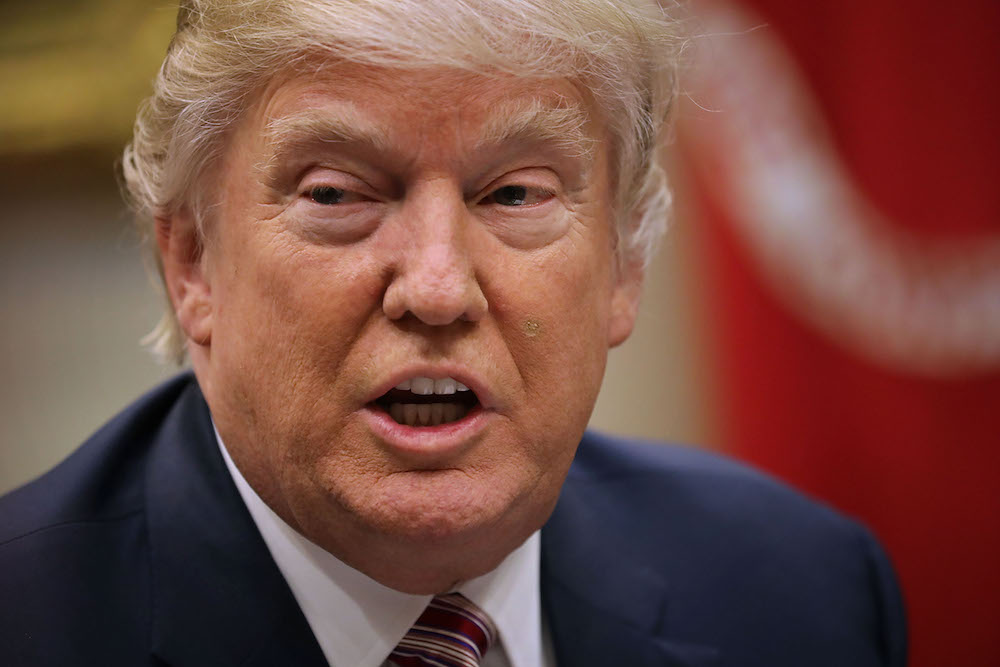“BREAKING: We’ve got Trump tax returns,” Rachel Maddow tweeted at around 7:30 Tuesday night, an hour and a half before her nightly show was scheduled to air on MSNBC. And in case you had any doubts about whether the revelations she’d make that night would live up to the hype, she finished the tweet with an affirmation that what she had was the real deal: “(Seriously.)”
BREAKING: We've got Trump tax returns. Tonight, 9pm ET. MSNBC.
(Seriously).
— Rachel Maddow MSNBC (@maddow) March 14, 2017
What Maddow revealed were two pages of Trump’s 1040 form from 2005, which had been obtained by the Pulitzer-winning financial writer David Cay Johnston, a guest on the show. Getting any tax information at all from the first president since LBJ to withhold his returns from the American pubic is a journalistic feat worth celebrating, but the actual contents of the 2005 1040 left a little to be desired: while they contained information about Trump’s overall income and tax rates, Johnston didn’t get any pages regarding the sources of that income–pages that could outline conflicts of interest, for instance, or his potential ties to Russian oligarchs. The consensus among journalists was that by positioning Johnston’s scoop as a blockbuster, and giving a lengthy monologue before actually presenting it, Maddow had oversold what he’d actually obtained and gave Trump and the right wing media an opportunity to characterize liberal reporting as overwrought and biased. As CNN’s Dylan Byers points out, even sister network CNBC couldn’t resist taking a shot: “Donald Trump just got a nice victory, thanks, of all people, to Rachel Maddow,” one of their headlines read.
But the overeager presentation doesn’t negate the substance of Johnston’s reporting. If the New York Times had obtained the documents, they’d publish a fastidious, soberly written story about them, but they’d still put it on the front page. For Maddow, cable news requires a certain level of spectacle, and in this case it wasn’t commensurate with the actual scoop. And though the returns don’t contain any blockbusters, they do reveal some interesting truths about our 45th president.
He’s wealthy beyond your wildest dreams
We knew that already, of course. But any concrete indication of Trump’s riches–gained in part on the backs of poorly compensated employees and through discriminatory housing rentals–is valuable as a reminder of the chasm between his presentation as a champion for the everyman and the way he’s actually lived his life. The returns obtained by Johnston showed that Trump reported an income of $153 million in 2005. Put another way, that’s $419,000 every single day–five times as much as the average American coal miner makes in an entire year.
He didn’t pay any more taxes than were legally required of him–and would be paying even less if it were up to him
Again, not really a surprise. When the Times got a look at Trump’s 1995 tax returns last year, they showed that he declared a $916 million loss that year–a deficit so large that he’d be able to avoid paying any federal taxes for many years after that. Robber barons don’t get to be robber barons by paying out too much for anything, taxes or otherwise, so it’s to be expected that Trump would make sure to be shelling out only what is legally required–in this case, $38.5 million in federal income taxes. What’s most interesting is the fact that Trump paid $31 million of that sum–the vast majority–under a rule called the alternative minimum income tax, which his campaign tax plan specifically called for abolishing. If the AMT were struck down and the president had to file an identical return this year, he’d only have to pay out about 5.5% of his income in federal income taxes–a lower rate than the average paid by families who make between $75,000 and $100,000 per year, less than 0.1% of Trump’s income, the Times reported.
Trump can disclose information about his taxes, even if he’s under audit
When Trump began waving away calls to release his returns during the campaign–a standard operating procedure for major party nominees for decades–he gave the excuse that he was under audit from the IRS, rendering him unable to release them. Many tax experts pointed out at the time that an audit did not actually legally prevent Trump from releasing his returns, but he held fast to the line. After Maddow began hyping her scoop last night, the White House preempted the show with a statement that confirmed the returns as authentic, but downplayed their news value, explicitly informing reporters of the income and tax figures on the 2005 1040 before Maddow had a chance to publicize them. This shows that Trump and his administration know that they are legally free to release his returns and simply choose not to, despite the president’s misleading statements about his audit.
Ultimately, though there is nothing explosive in the returns, the fact that someone leaked them at all, and that MSNBC published them, is encouraging. Though the White House’s statement about the leak called MSNBC’s report “illegal,” reporting on the finances of the president is clearly protected under the First Amendment. Assuming Trump’s Justice Department doesn’t actually seek to prosecute Maddow and the leaker, the story may embolden further leakers to come forward and give the public information about our president that we should have already received from the president himself months ago.





